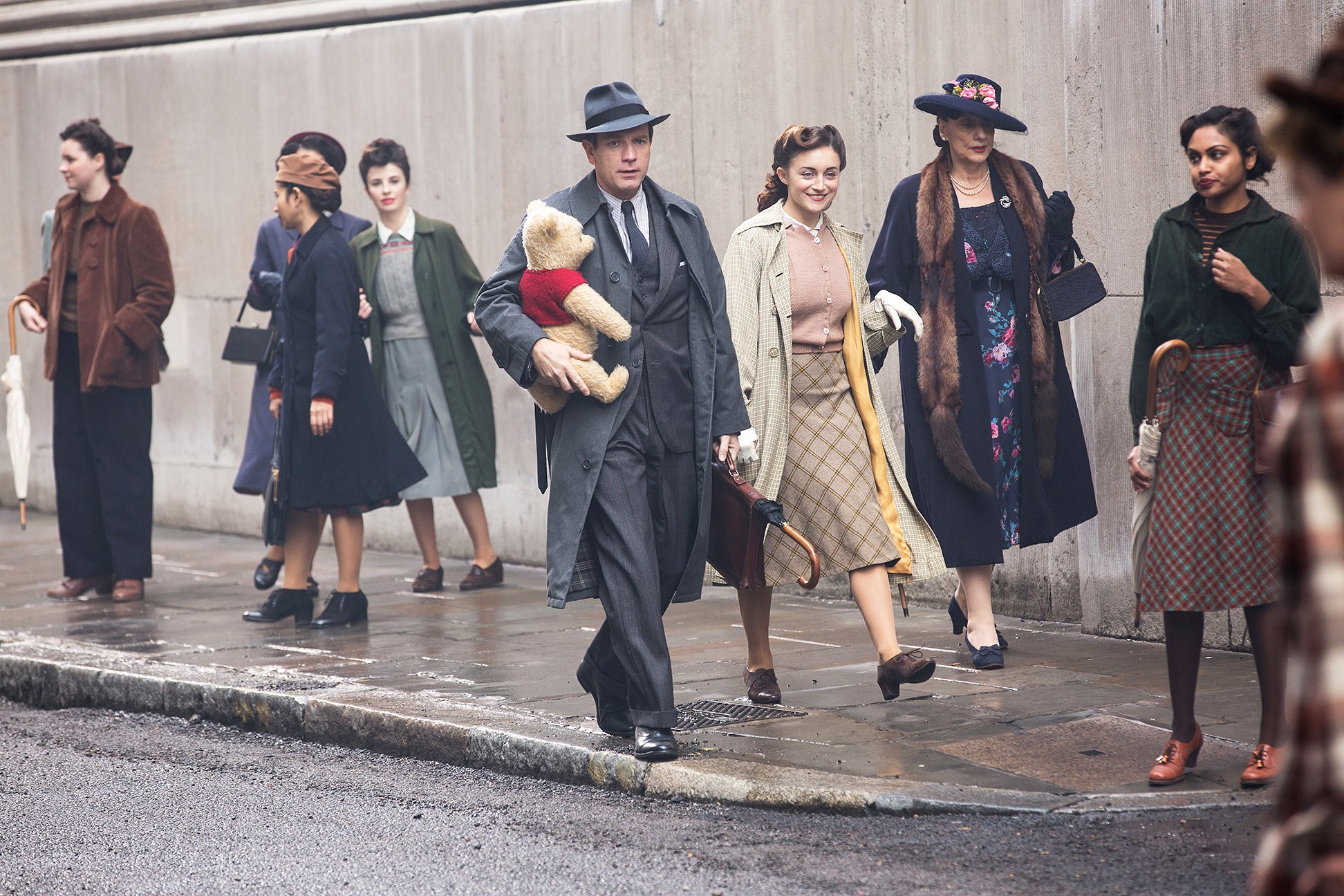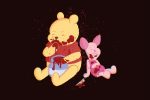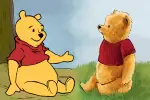“Christopher Robin,” a new movie based on the “Winnie the Pooh” books, is the latest film to embrace the newest trend in Hollywood: taking popular characters from the past and focusing them toward adults rather than kids. Everybody loves a hit of nostalgia, and the wholesome shows we watched as kids are as nostalgic as you can get. The “Toy Story” series, for example, showed this in its third installment when Andy grew up and no longer played with Woody and the other toys. The movie focused on the feeling of abandoning childhood and letting things go, and evoked the feelings of nostalgia with ease.
It’d be easy to imagine, then, that “Christopher Robin” would do the same with Winnie the Pooh. Most people have some sort of tie to Pooh and his friends and bringing those memories to life should be a quick way to get tears flowing. “Christopher Robin” takes a different approach. The theme of the movie isn’t about regretting that everybody grows up, but that sometimes people grow up too much.
#ChristopherRobin Review: Even those who cried when Andy parted ways with his playthings in 'Toy Story 3' will be left dry-eyed in Disney's latest live-action reboot https://t.co/K4CKJl9ixk pic.twitter.com/elOopShCKT
— Variety (@Variety) August 3, 2018
For the most part, “Christopher Robin” does a pretty good job of delivering its message, but there are a few major flaws that hold the experience back. Among those problems is the fact that, unlike anything Pixar is making, “Winnie the Pooh” is far older and more recognizable.
First published in 1924 — a few years after the end of World War I — “Winnie the Pooh” is one of the oldest and most enduring franchises in the world. Despite focusing on children, people of all ages were quick to embrace the book. Soon “Winnie the Pooh” spread throughout the globe. Latin versions of books about the honey-loving character were among the first foreign language books to crack The New York Times Best Sellers List. Few stories are as prominent, well known and long lasting as ones involving Pooh Bear are. In fact, since its first publication, “Winnie the Pooh” has never been out of print.
With such a wide-ranging fan base, “Christopher Robin” faces different issues when exploring the idea of growing up. Winnie the Pooh reaches much further back than “Toy Story” — 94 years in fact — and has to target a much wider range of fans. Not only are they trying to reach kids who may not have grown up with “Winnie the Pooh,” but they are also trying to capture the attention of adults who did. It’s a balancing act that the film almost manages to pull off but fails to do so in the end.
Unfortunately, the movie fails in the most obvious way; “Christopher Robin” is not much of a kid’s movie. For example, my 3-year-old nephew sat through the entirety of “Hotel Transylvania 3” without fuss but wanted nothing to do with “Christopher Robin.” This is partly because the much of the movie moves at a snail’s pace.
The movie opens with Christopher Robin leaving the Hundred Acre Woods behind to enter boarding school. Soon after he becomes the man of the house after his father’s death. Years later he gets drafted into the military for World War I. Upon his return home, Robin has evolved from an innocent child into a war-addled adult struggling to make a place in the world for his family. When Pooh Bear appears to try and help Robin, he is met with harsh rejection. Christopher Robin has become jaded. He sees no purpose in romping around with Pooh Bear anymore.
Even for my older tastes, the first half of the film was rough to watch. Though the film’s director seemingly wanted people to feel sympathy for Robin, I found it difficult to care at all for his struggles, though this is not to say that the movie portrays Christopher Robin as a bad person. He’s very lost and confused, but deep down its clear he’s still a good person looking for a way out. Following him through his struggles evokes more frustration than sympathy, as Robin makes one poor choice after another.
Piling on top of that feeling is the way Robin treats Pooh Bear. The loveable Pooh is treated as a nuisance. Robin doesn’t want to deal with him and tries to get him to go away as quick as possible. These interactions drag on to the point that it felt like the entire film would be dark and brooding.
This all changes about halfway through the film, when Robin finally sees the error of his ways. What was a sad story tinged with a bit of humor becomes a happy romp with the characters we all knew. Though this was what I wanted to see, it still came off as a massive tonal change that follows one of the darkest moments in the film; Robin yells at Pooh, calls him names and drives the bear off. Pivoting to light and happy immediately after felt weird. It’s clear at this point that he is not the same person he was as a kid. But while Robin has been lost to adulthood, it never feels like he is not redeemable. He’s just resisting the return to his old self.
However, when Christopher Robin does finally return to his former self, the change feels a bit forced. The change comes fast and with little build up. Normally this is a moment of release for a film. Everything you’ve been waiting for comes to a head and the protagonist is redeemed in your eyes into a hero. Robin never feels like a hero. Even after his redemption, it has become clear things can never be the same again. In maturing Christopher Robin, they’ve taken away core pieces of what made him who he was. This is not the boy from the stories I knew, and that boy can never come back. Not in this film.
This, to me, is the biggest issue the film wrestles with. While Pooh and friends are all the same endearing characters I remember, their warmth always felt stifled by Christopher Robin’s hard edges. When those edges soften, it feels like too little too late. The film is no longer focusing on Robin’s struggles at this point, but rather on his family and friends. The story becomes a rescue operation rather than a trip of self-discovery.
This develops into what feels like an identity crisis for “Christopher Robin.” Current fans of the franchise will likely find something to enjoy in the film, but the movie isn’t aimed at them. Instead, it is trying to reach an audience of adults who can sympathize with Robin and feel the pull to return to childhood innocence. The problem is it doesn’t work. I never felt much sympathy for Robin. In fact, there were times I actively felt disdain for him and the way he treated Pooh Bear.
His redemption story became less and less important to me as the movie went on, and instead, I was more worried about how his attitude was affecting his young daughter and Eeyore, Piglet and Tigger. Those characters became the most important people in the story to me, and I couldn’t care less about what had happened to Robin. His redemption only meant I didn’t have to see him berate the other characters anymore, which is not much of a payoff.
With that in mind, it’s hard to recommend this film to everybody. If you love Pooh Bear and his friends, you’ll get a lot of enjoyment out of this film. The Hundred Acre Woods feels well put together. Areas are recognizable, and the characters feel as if they could be real stuffed animals existing alongside the actors. There are references and jokes that make sense if you’ve seen other “Winnie the Pooh” media and they are a nice nod to the long history the franchise has built up.
Those who aren’t as invested in the world of “Winnie the Pooh” will struggle a bit more. Little world building is done to explain the characters or the setting. The film relies on the idea that everybody has a passing knowledge of “Winnie the Pooh” and if you don’t then you’ll likely get lost in the references made. It’s worth a look if you want something family-friendly to pass the time, but you can likely get the same thing somewhere else.














